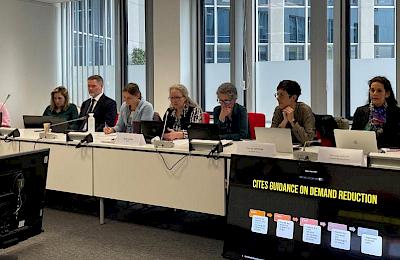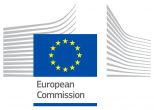European Commission Expert Roundtable Discusses The Role Of Behaviour Change Approaches In Addressing Illegal Wildlife Trade
On 21 March, TRAFFIC helped organise and participate in a European Commission event to exchange lessons learnt and identify best practices to reduce consumer demand for illegally traded wildlife in line with the new EU Action Plan against wildlife trafficking.
With around 130 representatives online and in person, a critical feature of this Roundtable focused on what European Union CITES competent authorities, industry associations, trading companies, civil society and behaviour change and market research experts can do to reduce the demand for illegal or unsustainable trade wild species in Europe.
Reducing consumer demand for illegally traded goods is the first objective in the revised EU action plan against wildlife trafficking. The EU will aim to address it by implementing awareness-raising activities and well-targeted, social science-based demand-reduction activities, targeting in particular behavioural change by consumers in the EU and outside.”
Jorge Rodríguez Romero, Head of Unit for Global Environmental Cooperation and Multilateralism of the European Commission’s Directorate General for Environment at the beginning of the meeting.
Seizure data (e.g., from 2020) illustrate where the demand for illegally traded CITES-listed species in EU markets needs to be reduced. Plant-derived ingredients for aromatic and medicinal purposes, reptile and bird bodies, parts and derivatives, and live reptiles and birds for the pet trade have been among the top seizures in the last few years, highlighting specific species where behaviour change initiatives should be considered to promote legal and sustainable trade and complement regulatory measures.

Gayle Burgess, TRAFFIC’s Behaviour Change Programme Leader, presented the CITES Demand Reduction Guidance, which was developed by TRAFFIC and was adopted at the 19th meeting of the Conference of Parties to the Convention on International Trade in Endangered Species of Wild Fauna and Flora (CITES) in November 2022.
“In recent years, almost a quarter of seizures in Europe were plant-derived medicinal products (including food supplements and cosmetics), and a large market for threatened or endangered wild species used as pets across the region is also apparent,” said Gayle Burgess, as she cast a spotlight on the types of illegal or illicit products seized in the region.
Implementing behaviour change approaches to reduce demand for illegal trade and promote more responsible consumption is an important measure that can be undertaken to address this.”
Gayle Burgess, TRAFFIC’s Behaviour Change Programme Leader.The medicinal products panel speakers reasoned that many species of concern are at risk from increasing demand and lack of sustainability considerations, largely due to a lack of visibility and accountability. The discussion revolved around how companies can have higher due diligence, be able to trace back to sources despite the complex supply chains and need to understand the conservation and social risks or opportunities to create wider behaviour change.
“Recently launched WildCheck platform is a good example of a new tool to support transparency and due diligence in CITES-listed medicinal and aromatic plants. It offers risk and opportunity insights and advice on twelve commonly wild-harvested species and acts as a blueprint for sourcing wild ingredients to support businesses and wider policy scoping,” highlighted Anastasiya Timoshyna, TRAFFIC’s Director of Strategy, Programme, and Impact and moderator of the medicinal products panel.
“TRAFFIC welcomes that the Commission, in its EU Action Plan, prioritises consumer engagement strategies as vital elements in addressing illegal trade in wildlife. We look forward to supporting European stakeholders in their ambition to use behaviour change principles to reduce demand for illegal trade in wildlife,” concluded Gayle Burgess.
The European Commission will release a summary report of the Roundtable discussions.
About European Commission

The European Commission promotes the general interest of the EU by proposing and enforcing legislation as well as by implementing policies and the EU budget.




